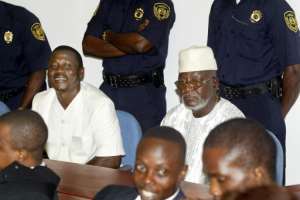
Freetown (AFP) - A militia commander convicted of Sierra Leone civil war atrocities was on Friday back in custody after allegedly violating the terms of his early release, the UN-backed court that jailed him said.
Moinina Fofana was the leader of a notorious paramilitary unit that shot, hacked and burned to death civilians suspected of collaborating with rebels.
His pro-government Civil Defence Forces (CDF) recruited traditional hunters to fight rebels during the 1991-2002 conflict in the west African state.
Fofana was convicted in 2008 of war crimes and crimes against humanity by the The Special Court for Sierra Leone.
He was granted conditional release on February 10, 2015 after serving two-thirds of his 15-year jail term at Mpanga Prison in Kigali, Rwanda.
On Friday, however, he was again being held in custody for "allegedly violating the terms of his release from detention", the Special Court said in a statement.
He was brought to the capital Freetown on Thursday night under heavy security from his home in Sierra Leone's second city, Bo, his family told AFP, adding that they were surprised by the development.
The court's Kenyan president, judge Philip Waki, had sent the order as "one of the special conditions was for him to conduct himself honourably and peacefully in the community," and to stay away from meetings where civil unrest was planned, the statement added.
It did not specify exactly why Fofana was re-arrested, but Waki also ordered that Fofana appear before a Sierra Leonean judge within seven days.
The Special Court for Sierra Leone was established by the UN in 2002 to try those who bore "the greatest responsibility" for the atrocities during the civil war.
The conflict, financed largely by so-called blood diamonds, left 120,000 people dead and tens of thousands mutilated.




 Election 2024: Mahama will destroy my legacy if he wins, so, go out, register an...
Election 2024: Mahama will destroy my legacy if he wins, so, go out, register an...
 UE/R: Your 2-year 'bitterness' towards our members 'shameful' - Three teacher un...
UE/R: Your 2-year 'bitterness' towards our members 'shameful' - Three teacher un...
 'I'm not running for office for power; I just want to solve Ghana’s problems' — ...
'I'm not running for office for power; I just want to solve Ghana’s problems' — ...
 Limited voter registration exercise delays in Tema due to technical problems
Limited voter registration exercise delays in Tema due to technical problems
 Biometric Verification machines fail to function in Kadjebi
Biometric Verification machines fail to function in Kadjebi
 Voter Registration: Technical hitches impede exercise at La Dade Kotopon
Voter Registration: Technical hitches impede exercise at La Dade Kotopon
 Technical issues delay voter registration exercise in Takoradi
Technical issues delay voter registration exercise in Takoradi
 Limited voter registration exercise delays at Keta
Limited voter registration exercise delays at Keta
 V/R: Limited voter registration exercise delays in Hohoe
V/R: Limited voter registration exercise delays in Hohoe
 EC limited voter registration exercise faces massive challenges
EC limited voter registration exercise faces massive challenges
